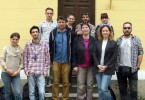Asli Tunc
The presenter on a popular Turkish TV was trying to hide her feelings while reporting the crash of the Turkish Airlines plane in Amsterdam a couple of weeks ago. Allegedly the Dutch emergency crew intentionally had not come to the rescue of the pilots and wounded passengers and kept them waiting for 45 minutes in the middle of the muddy fields near Schiphol Airport. How could they do such a thing? It must have been because we were Turks, wasn’t it?
“Turks have no friends but themselves” is a popular saying that most of us believe in. But lately this general belief among the Turkish society became more and more visible in news reporting. The “us vs. them” dichotomy started to lead us to a rather concerning ethnocentric view of the world. We feel more isolated on the global arena, being paranoid at times blaiming the non-Turks for every single bad incident. This feeling might be explained both with the rising nationalist sentiment and also with frustration because Turks believe they have been treated unfairly in the EU accession process. As a bottom line, Turks do not feel sympathy to any nation. In fact this was double-checked and revealed in a BBC World Service-GlobeScan Poll last month. This global poll is taken in 21 countries annually to learn the public views of each country’s of others. The results indicated that Turkey was the only country where the public views were predominantly negative. According to the results, Turkish public opinion showed great distrust in the US, Canada, all the EU countries, India, Russia, Brasil, Japan, South Africa, and you name it. Well, did it come as a surprise to you? Probably not.
Ethnocentrism is defined as the tendency to look at the world primarily from the perspective of one’s own culture. In other words, it is a cultural bias and it has psyhological underpinnings. Ethnocentric people are more comfortable with and prefer the company of people who are like themselves, sharing similar values and behaving in similar ways. They resist or refuse the new meanings and new thought patterns since they are seen as being less desirable than those of the birth culture. Those psychological reflexes are very common in most of the news reporting in Turkey. For instance, Turkish TV channels failed terribly in reporting the school shooting incident in Germany. While it was still an unfolding story, the channels only focused on the question whether there was any Turkish victim rather than the newsworthy items of the incident itself. It seemed as if the only important aspect of the story was the Turkish involvement in the rampage. Suddenly a news flash popped up on the screen. A boy named, İbrahim had been killed in the shooting. The name was sounding Turkish so we felt we had lost “one of us” after all. The Turkish TV channels focused on the boy for a few hours as the Turkish victim. After hours of coverage, it turned out that İbrahim was from Kosovo. The TV channels eventually lost interest in the story. Those were just a couple of recent stories where we could trace down the signs of ethnocentric news reporting. Yes, it is not new that we do not like other nations much but media’s role in blowing it out of proportion is what this country definitely does not need right now.






